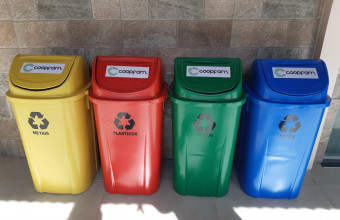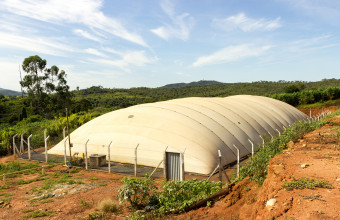A cooperative from the interior of the state of Mato Grosso do Sul was one of the first in the country to negotiate carbon credits with international partners. A story that proves: behind every challenge there are great opportunities.
It all started in 2005, when the Cooperative of São Gabriel do Oeste (Coasgo) began to take a closer look at the environmental impacts of its production. It noticed that the deposit of untreated waste produced a foul odor in the vicinity of the properties. This not only generated complaints from local residents, but also posed a real risk of environmental contamination, with special concern about the Guarani Aquifer.
Before this could happen, the cooperative set an audacious goal: to find an efficient alternative for sustainable manure management that, in addition to being environmentally friendly, would help increase the cooperative members’ productivity.
After much research, the Coasgo team signed a partnership with AgCert – a Canadian company specialized in carbon sequestration, based on the Kyoto protocol and the use of the Clean Development Mechanism (CDM). Together, they have implemented a pilot project of biodigesters for swine manure. The technology consists of creating an airtight environment for the anaerobic decomposition of this material. The biogas resulting from this chemical process is used to generate clean and sustainable electricity and biofertilizers.
The initial investments were made by technology companies such as AgCert and Brascarbon, which benefited from the carbon credits generated by the reduction of greenhouse gas emissions by the cooperative. An innovative partnership in the cooperative movement, with an additional gain for the cooperative members: the technology was made available to all Coasgo members, regardless of the size of the property, at no initial cost to the producer.
ADDITIONAL BENEFITS
Since its implementation 16 years ago, Coasgo’s biodigestion project has generated 27.8 million kilowatts of clean, sustainable energy, which has been reverted to benefit the cooperative members themselves. It also helped the cooperative reduce greenhouse gas emissions by 194.9 million cubic meters, helping to mitigate the advance of global warming. This result guaranteed Coasgo around R$3.5 million in carbon credits.
Another direct benefit of installing the digesters was the recycling of organic matter and nutrients from the pig herd. Since the beginning of the program, the members have managed to improve the hygiene of the animal breeding facilities by treating their waste.
The project also resulted in savings in the demand for electricity production and distribution, improved animal and personal hygiene conditions, and reduced rates of environmental contamination by harmful microorganisms and parasites. For the community, the preservation of riverbeds and groundwater was the most important achievement. It has not only improved people’s quality of life, but has also increased their confidence in the future of the cooperative and the planet.





